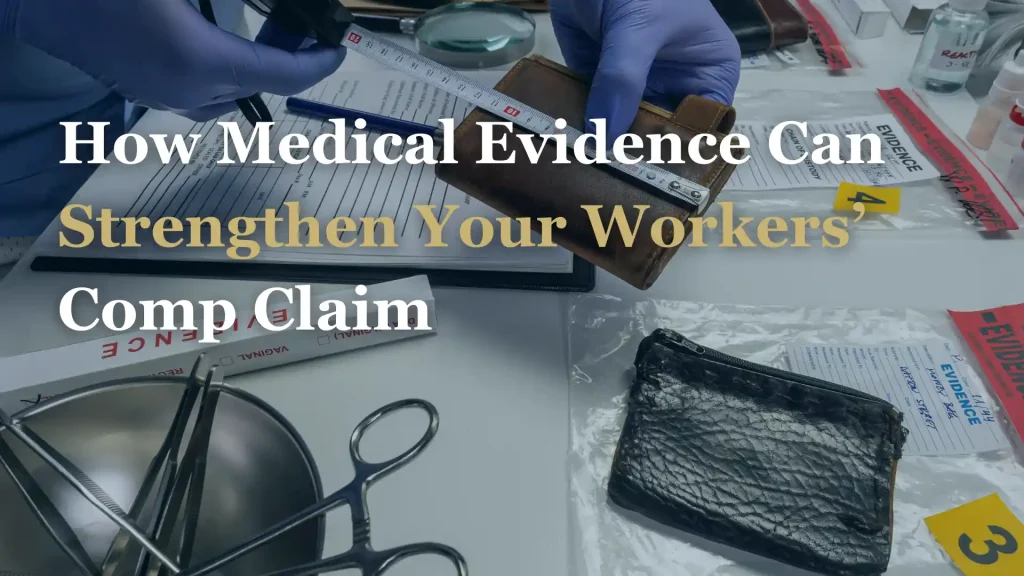 Suffering an injury on the job can create a stressful and uncertain situation. Unlike other personal injuries, work-related accidents must typically go through your employer’s workers’ compensation insurance, if they even have it. Substantial medical evidence in workers’ comp cases is often critical to proving the severity of your injury and securing the benefits you deserve.
Suffering an injury on the job can create a stressful and uncertain situation. Unlike other personal injuries, work-related accidents must typically go through your employer’s workers’ compensation insurance, if they even have it. Substantial medical evidence in workers’ comp cases is often critical to proving the severity of your injury and securing the benefits you deserve.
In South Dakota, employers are not legally required to have workers’ compensation coverage. Injured workers face delays or denials in their treatment and benefits.
Medical evidence in workers’ comp cases becomes crucial to your case when a claim is denied or insurance is unavailable. Thorough documentation can make the difference between a denial and approval of benefits. Suppose you suffered injuries in a work-related accident. In that case, a workers’ compensation attorney can help you through the complex legal process by taking the lead in gathering evidence to support your claim.
What Is Medical Evidence in Workers’ Comp Cases?
Medical evidence is crucial to your case. It helps define the nature of your injury, the severity of your condition, and the long-lasting impact on your livelihood. Without evidence, your case can easily be disputed and dismissed. Insurance companies and employers often attempt to minimize or deny your injury. Insurers may claim that your injury is pre-existing or related to a non-work accident without substantial documentation. Understanding the importance of swift medical attention and following up with providers is crucial to strengthening workers’ comp.
Key Types of Medical Evidence
Several types of medical evidence can be utilized in your workers’ compensation claim. It is essential to know and understand what these are. Key types of medical evidence include:
- Medical Records – These include initial injury reports, emergency room visits, ongoing treatment, and medication records. The more detailed these records are, the stronger your claim is.
- Diagnostic Tests for Injury Claims – These include results from X-rays, MRIs, CT scans, and other diagnostic tests that can provide objective evidence of injuries, such as fractures, torn ligaments, or nerve damage.
- Functional Capacity Evaluations (FCEs) – This comprehensive assessment determines the extent of the worker’s injuries and physical limitations and when they can return to work.
Understanding the types of medical evidence used in workers’ compensation claims helps you know what to document and request from your physician, especially if you need help paying medical bills related to your workplace injury.
Proving Work-Related Injuries
Even if your medical records support evidence of an injury, your employer and the insurance company may try to dispute the claim, arguing that the injury occurred outside of work. Workers’ compensation is held to the legal standard of proof, meaning they must prove the injury happened because of work. Strong medical documentation and evidence can support your claim.
Establishing causation in workers’ compensation cases may be difficult, so clear medical documentation is crucial. A doctor’s role in workers’ compensation cases is vital. Their statements carry significant weight in a claim and can even prove that an injury occurred due to job-related duties.
Furthermore, they may require specialist opinions to provide additional evaluations and expert opinions in complex situations. This is especially relevant in injuries involving long-term disabilities and chronic conditions.
Proving work-related injuries may be complex, but hiring a workers’ compensation attorney and visiting doctors who understand these cases is essential to protect your rights and maximize your recovery.
Medical Disputes in Workers’ Compensation Claims
Unfortunately, workers’ compensation insurance companies and employers may dispute your claim. Even if the doctors’ reports support your claim, they may dispute your claim if they disagree with your diagnosis, treatment plan, or disability rating. These disputes can delay benefits or result in a complete denial of claims.
You may also need to undergo an Independent Medical Examination (IME) if a dispute arises with your claim. If an insurance company disagrees with the results from your doctor, they may require an IME. This is conducted by a third-party doctor hired by the insurer to provide a second opinion. During an IME, the doctor will investigate:
- The Severity of Your Injury – The IME may assess your injury and determine whether your symptoms align with the type of injury you sustained.
- The Appropriateness of the Treatment Recommendations – The IME may determine whether the treatments prescribed by the initial doctor are appropriate for the injury.
- Whether You’ve Achieved Maximum Medical Improvement (MMI) – The IME may be asked to reevaluate the MMI, which is the point at which an injury isn’t expected to improve further.
- Whether You Need Specific Work Restrictions – The IME may be required to provide a second opinion on the worker’s restrictions.
- The Relationship of Your Injury to Your Job – The IME may assess whether the condition could have resulted from a pre-existing condition or non-work activities.
The IME may agree with your physician. Or, you may have your claims disputed. When that happens, legal counsel may be imperative to defend your rights and request an appeal.
Strengthening Workers’ Compensation Cases with Medical Evidence
 Having strong support for your claim can help you protect your rights. Gathering and maintaining comprehensive medical records is essential to increase your chances of a successful workers’ compensation claim. This includes:
Having strong support for your claim can help you protect your rights. Gathering and maintaining comprehensive medical records is essential to increase your chances of a successful workers’ compensation claim. This includes:
- Retaining Medical Documentation – Keep detailed copies of all medical reports, test and imaging results, and doctor notes related to your injury.
- Keeping Up with Treatment – Continue to attend all appointments, listen to the doctor’s orders, and follow up on treatment, including medication and rehabilitation.
- Seeking Legal Guidance – Gathering strong medical evidence is essential. A workers’ compensation attorney can ensure you have all the proper documentation and challenge any disputes.
Dealing with the aftermath of a workplace injury is tiring and tedious. A workers’ compensation attorney can handle all the legalities, so you only need to focus on your recovery.
Contact a Workers’ Compensation Attorney Today
Hiring a Watertown workers’ compensation attorney can help advocate for your rights if you have been injured in a workplace accident. Our dedicated team at Turbak Law Office, P.C. is here to fight for you and protect your rights. We have over 40 years of experience in all personal injury, including workers’ compensation. Our team concentrates on these cases, so you will feel confident in our ability to represent you. Contact us online or today at 605-886-8361 for a free consultation.